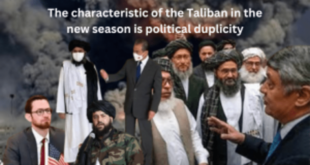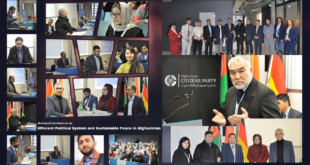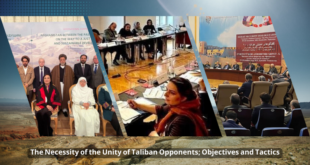Dr. Mohammad Shafaq Khawati
The rationality of tribal political governance in Afghanistan has been influenced by two intertwined dialectics: the structural and agent dialectics, with the predominance of structural roles over agency, and the governing dialectic among three structural domains, namely “antagonistic and tribal culture and religion,” “plundering economy,” and “extractive and despotic tribal politics.” This second dialectic has also been realized through the mediation of agency elements.
“The outcome of the dialectical process of cultural and economic structures of Afghan society and the outcome of the dialectical process of structure and agency throughout the contemporary history of Afghanistan have been the predominance of structural imperatives over agency in Afghanistan. The dominance of structures over agency has led to the stagnation of the Afghan agency’s mindset, social recession, and the halt of progress in Afghanistan. Consequently, due to the stagnation of the agency’s mindset, Afghan society has reached a state of cultural stagnation, intellectual obstruction, and resistance to social dynamism. This stagnation and obstruction, or the recession and halt of progress, have imparted a characteristic of distance and repetition to the history of Afghanistan. The history of developed societies, on the other hand, has had a nature of evolution and an upward trajectory.”
Some Third World societies have also followed a semi-evolutionary path. However, in Afghanistan, it seems that with the cessation of time, this society has been revolving around itself for nearly three centuries, without any kind of dynamism and transformation in its trajectory, except for the repetition of past patterns. Any transformation in the course of history and changes in the direction of structures are subject to the effective intervention of a skilled “agent” who emerges in some societies. However, in societies like Afghanistan, we have lacked skilled agents who could take steps towards the movement of history. The historical trajectory of Afghan society can be demonstrated as follows, in comparison to other societies.
This cycle of regression and stagnation has occurred as a result of the extremist prohibition of past practices and the fear of innovators and breaking with tradition among the agents. Any kind of rethinking, innovation, and deviation from habitual practices, contrary to the structural movements, has led to the ruthless expulsion and elimination of the agents of innovation. It is happening at a time when Europe is taking steps towards the Renaissance, while the Islamic world is experiencing a process of backwardness.
However, in Afghanistan, even when many Asian countries are taking an upward trajectory, our cycle of regression reaches its turning point and intensifies. As observed in previous seasons, after the emergence of Ahmad Shah Abdali, although Afghanistan is said to have an independent government according to official historians (although this independence has not been more than a myth), culturally, economically, and overall in terms of its civilization, it rapidly enters a steep decline. The arrival of Ahmad Shah (marking the beginning of a prolonged cycle of regression over the past three centuries) in Afghanistan coincides with the peak of Western advancement in industry and the expansion of concepts such as human rights, equality, citizenship, etc., in Europe.
However, simultaneous with the Western Renaissance and the Industrial Revolution in Europe, even relatively advanced Asian countries today, such as China and Japan, which had a glorious civilization in ancient times, fell far behind the Western wave of renewal until the 17th and 18th centuries. They secluded themselves and, due to a fear of foreign influence and an aversion to the West, made efforts to preserve their own traditions. But from the 17th century onwards, they engaged in calculated manipulation of their social and cultural traditions and began an era of dynamism and progress, which included reinterpreting and reevaluating the teachings of Confucius.
Of course, concurrent with the Western Renaissance and the Industrial Revolution in Europe, even relatively advanced Asian countries today, such as China and Japan, which had a glorious civilizational history in ancient times, fell far behind the Western wave of renewal until the 17th and 18th centuries. They retreated into their own shells and, due to xenophobia and anti-Western sentiment, made efforts to preserve their own traditions. However, from the 17th century onwards, they engaged in calculated modifications within their social and cultural traditions and began a process of dynamism and progress. This included reinterpretation or reevaluation of Confucian teachings.
However, in the contemporary history of Afghanistan, economic and cultural structures have dominated and constrained Afghan agency, depriving Afghan actors of agency and subjectivity. Until this historical period, the structure has been dominant in Afghanistan, and in the dialectic of structure and agency, the weight of structural influence has been heavier than the effectiveness of agency. The Afghan actor has only engaged in replicating the necessary actions dictated by the structural conditions, perpetuating and reproducing its characteristics, without being able to bring about any significant changes in the direction of structural movements.
Now, how can subjectivity be restored to the Afghan subject, or how can the production of subjectivity be pursued, and with what mechanism can a definite path of exit be sought to overcome this obstruction, stagnation, and resistance? Is it possible for the Afghan actor to break free from the entrapment of the structural spider’s web, break free from the shackles of entrenched traditions, and transcend the rule of tribalism? Answering these questions requires reflection on the mechanism of mental stagnation of the actor and the factors of resistance played by the actor in Afghanistan.
 حزب شهروندان افغانستان وبسایت رسمی حزب شهروندان افغانستان
حزب شهروندان افغانستان وبسایت رسمی حزب شهروندان افغانستان


